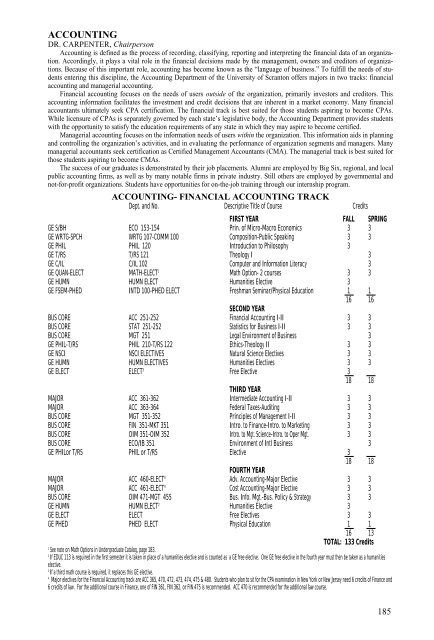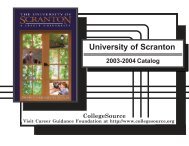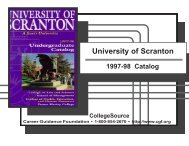You also want an ePaper? Increase the reach of your titles
YUMPU automatically turns print PDFs into web optimized ePapers that Google loves.
ACCOUNTING<br />
DR. CARPENTER, Chairperson<br />
Accounting is defined as the process <strong>of</strong> recording, classifying, reporting and interpreting the financial data <strong>of</strong> an organization.<br />
Accordingly, it plays a vital role in the financial decisions made by the management, owners and creditors <strong>of</strong> organizations.<br />
Because <strong>of</strong> this important role, accounting has become known as the “language <strong>of</strong> business.” To fulfill the needs <strong>of</strong> students<br />
entering this discipline, the Accounting Department <strong>of</strong> the <strong>University</strong> <strong>of</strong> <strong>Scranton</strong> <strong>of</strong>fers majors in two tracks: financial<br />
accounting and managerial accounting.<br />
Financial accounting focuses on the needs <strong>of</strong> users outside <strong>of</strong> the organization, primarily investors and creditors. This<br />
accounting information facilitates the investment and credit decisions that are inherent in a market economy. Many financial<br />
accountants ultimately seek CPA certification. <strong>The</strong> financial track is best suited for those students aspiring to become CPAs.<br />
While licensure <strong>of</strong> CPAs is separately governed by each state’s legislative body, the Accounting Department provides students<br />
with the opportunity to satisfy the education requirements <strong>of</strong> any state in which they may aspire to become certified.<br />
Managerial accounting focuses on the information needs <strong>of</strong> users within the organization. This information aids in planning<br />
and controlling the organization’s activities, and in evaluating the performance <strong>of</strong> organization segments and managers. Many<br />
managerial accountants seek certification as Certified Management Accountants (CMA). <strong>The</strong> managerial track is best suited for<br />
those students aspiring to become CMAs.<br />
<strong>The</strong> success <strong>of</strong> our graduates is demonstrated by their job placements. Alumni are employed by Big Six, regional, and local<br />
public accounting firms, as well as by many notable firms in private industry. Still others are employed by governmental and<br />
not-for-pr<strong>of</strong>it organizations. Students have opportunities for on-the-job training through our internship program.<br />
ACCOUNTING- FINANCIAL ACCOUNTING TRACK<br />
Dept. and No. Descriptive Title <strong>of</strong> Course Credits<br />
FIRST YEAR FALL SPRING<br />
GE S/BH ECO 153-154 Prin. <strong>of</strong> Micro-Macro Economics 3 3<br />
GE WRTG-SPCH WRTG 107-COMM 100 Composition-Public Speaking 3 3<br />
GE PHIL PHIL 120 Introduction to Philosophy 3<br />
GE T/RS T/RS 121 <strong>The</strong>ology I 3<br />
GE C/IL C/IL 102 Computer and Information Literacy 3<br />
GE QUAN-ELECT MATH-ELECT1 Math Option- 2 courses 3 3<br />
GE HUMN HUMN ELECT Humanities Elective 3<br />
GE FSEM-PHED INTD 100-PHED ELECT Freshman Seminar/Physical Education 1 1<br />
SECOND YEAR<br />
16 16<br />
BUS CORE ACC 251-252 Financial Accounting I-II 3 3<br />
BUS CORE STAT 251-252 Statistics for Business I-II 3 3<br />
BUS CORE MGT 251 Legal Environment <strong>of</strong> Business 3<br />
GE PHIL-T/RS PHIL 210-T/RS 122 Ethics-<strong>The</strong>ology II 3 3<br />
GE NSCI NSCI ELECTIVES Natural Science Electives 3 3<br />
GE HUMN HUMN ELECTIVES Humanities Electives 3 3<br />
GE ELECT ELECT3 Free Elective 3<br />
THIRD YEAR<br />
18 18<br />
MAJOR ACC 361-362 Intermediate Accounting I-II 3 3<br />
MAJOR ACC 363-364 Federal Taxes-Auditing 3 3<br />
BUS CORE MGT 351-352 Principles <strong>of</strong> Management I-II 3 3<br />
BUS CORE FIN 351-MKT 351 Intro. to Finance-Intro. to Marketing 3 3<br />
BUS CORE OIM 351-OIM 352 Intro. to Mgt. Science-Intro. to Oper Mgt. 3 3<br />
BUS CORE ECO/IB 351 Environment <strong>of</strong> Intl Business 3<br />
GE PHILor T/RS PHIL or T/RS Elective 3<br />
FOURTH YEAR<br />
18 18<br />
MAJOR ACC 460-ELECT4 Adv. Accounting-Major Elective 3 3<br />
MAJOR ACC 461-ELECT4 Cost Accounting-Major Elective 3 3<br />
BUS CORE OIM 471-MGT 455 Bus. Info. Mgt.-Bus. Policy & Strategy 3 3<br />
GE HUMN HUMN ELECT2 Humanities Elective 3<br />
GE ELECT ELECT Free Electives 3 3<br />
GE PHED PHED ELECT Physical Education 1 1<br />
16 13<br />
TOTAL: 133 Credits<br />
1 See note on Math Options in Undergraduate Catalog, page 183.<br />
2 If EDUC 113 is required in the first semester it is taken in place <strong>of</strong> a humanities elective and is counted as a GE free elective. One GE free elective in the fourth year must then be taken as a humanities<br />
elective.<br />
3 If a third math course is required, it replaces this GE elective.<br />
4 Major electives for the Financial Accounting track are ACC 365, 470, 472, 473, 474, 475 & 480. Students who plan to sit for the CPA examination in New York or New Jersey need 6 credits <strong>of</strong> Finance and<br />
6 credits <strong>of</strong> law. For the additional course in Finance, one <strong>of</strong> FIN 361, FIN 362, or FIN 475 is recommended. ACC 470 is recommended for the additional law course.<br />
185
















